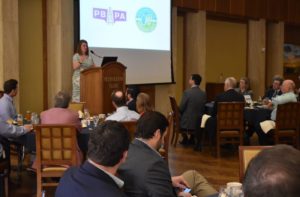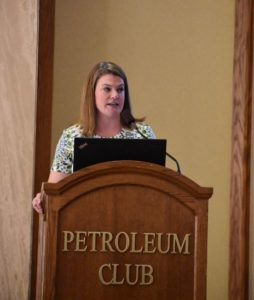MIDLAND, TEXAS—It was a meeting of the regulator and the regulated when TCEQ Commissioner Emily Lindley addressed the membership of the Permian Basin Petroleum Association (PBPA) in the Midland Petroleum Club as keynote speaker for its March 17 luncheon.
The Texas Commission on Environmental Quality is the environmental agency for the state. TCEQ employs approximately 2,800 workers who are located in 16 regional offices around Texas and also in the agency’s central office in Austin. TCEQ strives to protect the state’s public health and natural resources in a manner consistent with sustainable economic development. Its goal is clean air, clean water, and safe management of waste.
Lacking space here to present Lindley’s full remarks, we share some selected points below, and we refer you to a webpage for the full message (see accompanying box).
On What They Do
Lindley provided history on the TCEQ and a general outline of how they operate, then proceeded to explain a typical interaction between the TCEQ and an oil and gas business operating in the Permian Basin.
“The main reason you are [likely] ever to interact with the TCEQ is if you are emitting anything,” Lindley said. “So anything into the air, you probably need to be talking with us. Venting, flaring, that kind of stuff. We also now are regulating the [issuance of] discharge permits of wastewater related to oil and gas activities… Another thing I want you to know about us, and something that keeps us probably the most busy, is that TCEQ, when it comes to natural resources, is probably more engaged with EPA [than any other state agency]. We are talking to them daily and, well, sometimes we get along, and sometimes we don’t.
“Yes, we disagree with EPA on a lot of things. But, by and large, our staff and theirs do get along because we’ve got to move things along. And so while we struggle agreeing with them on a lot of issues, we do agree with them on some. And that’s how things get done. Because we are able to come to the table and a lot of times put the politics aside. So I’ll just mention that some of the things that we’re talking about a lot with them right now are the methane rule and Waters of the United States.”
Texas is Big
Lindley explained how Texas industries benefit from having a state-based regulator as opposed to a federal level regular, such as the EPA.
“Texas is big and we deal with a lot,” she said. “One thing I always tell people is that I consider myself very fortunate to be a Texan and, not to sound too cheesy when I say that, but what I mean is there’s a lot of states—and I’m talking even in [EPA] Region Six [where Texas resides] there are states that don’t have as sophisticated a natural resource agency as we have. To use New Mexico as the example… I know you [PBPA members] do a lot of work in New Mexico. In New Mexico, if you want to go get a permit to discharge wastewater, their state regulatory authority isn’t sophisticated enough. They don’t have the staff to do it. So they don’t. EPA issues those permits in the state of New Mexico. Well, I would say it’s lucky for you, if you need a permit like that, that you can come to the TCEQ, and you don’t have to go to the EPA.
“It’s just that we are big, we are large. We have amazing capabilities when it comes to monitoring the air, to testing the water. A lot of states just don’t have those resources and we do. And so consider yourselves very lucky to live in a state that can take care of you.”
Sunset Happens
TCEQ is coming up for a Sunset determination, and she devoted a few minutes to explaining the significance of that. She began by reading the following verbiage that she said came direct from the Sunset Commission’s website:
“The Sunset process shines a light on state agencies and programs to see if they are still relevant in a changing world. If the answer is yes, Sunset recommends improvements to make them more effective and efficient. If the answer is no, Sunset recommends abolishing the agency or transferring its functions to another agency with related functions.”
That, then, is the issue, as it is, periodically, for other Texas agencies, such as the Railroad Commission. Lindley continued:
“The Sunset Commission is made up of a number of elected officials. There’s a Sunset agency that has staff that do these reports on different state agencies. They present their report to the Commission and then the Commission—[made up of some of] your state senators, your state representatives—vote on this report that this Sunset advisory commission has put together. TCEQ is under sunset right now. What that means is we’re basically being audited top to bottom. I use the word ‘audited’ because everyone knows what an audit is and you can relate to how painful those are. This wouldn’t be an audit of your accounting program or an audit of one little slice of your company. It would be an audit of your entire company all at once.
“They do this every 10 years, roughly. They look at what you have you done in the past 10 years. What are you supposed to be doing? They write it all down in the report. They make recommendations and then that gets voted on. That vote will happen for us in October. Then come next [Legislative] session, that report will be put into a piece of legislation that will hopefully be voted on by members. And the TCEQ will continue to exist [if] we are not abolished. I think for us to be abolished would be bad for us in the State of Texas. It would be bad if we were to go away, because then who would be the regulatory authority? We would all go back to EPA. No one wants that. [Laughter.] But that group [Sunset] will make a lot of recommendations and those will all be public.
The report will come out May 26, Lindley said. “It’s really keeping us busy. Again, I could probably talk all through lunch about the Sunset process. PBPA, I know, will be supportive and will be helpful and probably has been already. Once that report is public and we all get to see it, then we’ll all see what they’re saying about us and the ways we need to improve. But it’s a very labor intense process. We did our self evaluation report last summer. We provided the Sunset Advisory Commission with 17 different recommendations that we thought we might need either to improve on or just raise awareness of.”
TCEQ’s Challenges Are Common to Other Employers
“We talked in our report about how it’s really hard to retain employees,” Lindley said. “You hear that from every state agency, especially out here in the Permian Basin. Our goal is always compliance. That’s what we want. We want people in compliance. If we have to go to enforcement, we will, but we like compliance first and foremost. Well, in order for us to have that consistency for you all to always know what it means to be in compliance, we need our workers and we need them to not leave. We need to have not as high turnover. We raised that as an issue—that it’s hard to help with the issue of compliance and other things in the regulatory world when you have such high turnover and when the cost of living increases.”
She concluded that part by saying, “What I mostly focused on probably for the next year, year and a half is making sure the agency gets through the Sunset process.”
And Some Good News
 “When we’re talking about ’emissions events,’ I was really happy to see these numbers [that she was about to share]. This is specifically for TCEQ’s Region Seven, which is mostly Permian Basin. Our Midland regional office is, by and large, [representative of] the bulk of the Permian Basin. In fiscal whole year 2019—we’re the state, so we do everything by fiscal whole year—we had a record high of 3,688 emissions events reported. Those are all self reported. In fiscal year 2020, there were 2,908. In fiscal year ’21, there were 2,152.
“When we’re talking about ’emissions events,’ I was really happy to see these numbers [that she was about to share]. This is specifically for TCEQ’s Region Seven, which is mostly Permian Basin. Our Midland regional office is, by and large, [representative of] the bulk of the Permian Basin. In fiscal whole year 2019—we’re the state, so we do everything by fiscal whole year—we had a record high of 3,688 emissions events reported. Those are all self reported. In fiscal year 2020, there were 2,908. In fiscal year ’21, there were 2,152.
And in fiscal [not calendar] year ’22, which we still haven’t closed out the books on that one, [we are sitting at] 789. So… do we want to see 700 mission events? No, but that’s a drastic decrease. So, kudos to you! That shows you are doing your part to help reduce those numbers. Thank you for working with us. It does matter. I will tell you all, you might not look at those emission events [yourselves], but there are a lot of groups, specifically NGOs [non-governmental organizations], that are constantly looking at those numbers and are constantly examining them. Thanks for your hard work in helping bringing those numbers down. That’s a great thing.”
As always, the luncheon included remarks from PBPA staff, giving updates on the status of various initiatives and efforts. If you are not getting regular (monthly or more frequent) transmissions of the association’s email newsletter [The Standard, by name] from the PBPA office, contact jamie@pbpa.info to be added to the email list.










